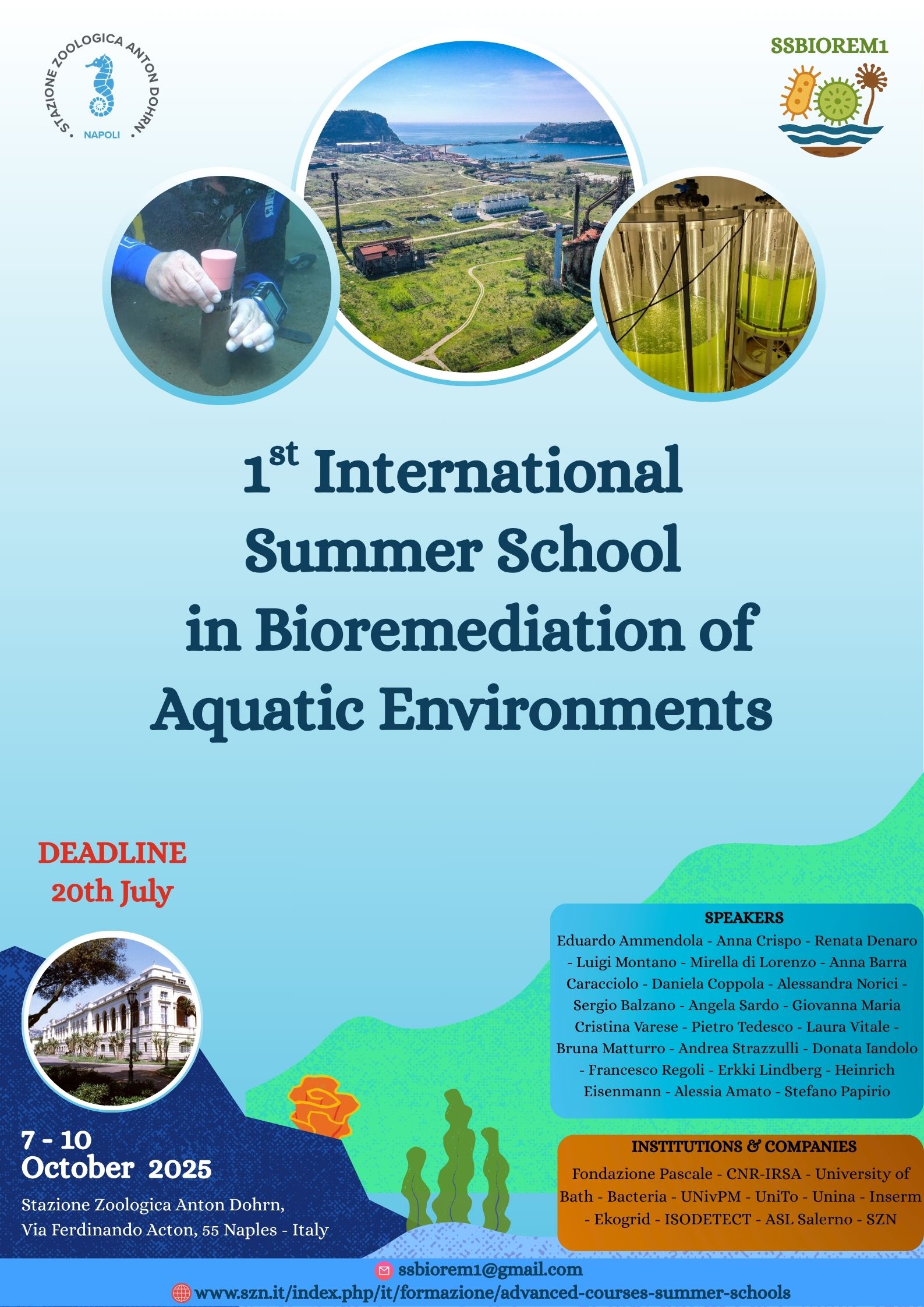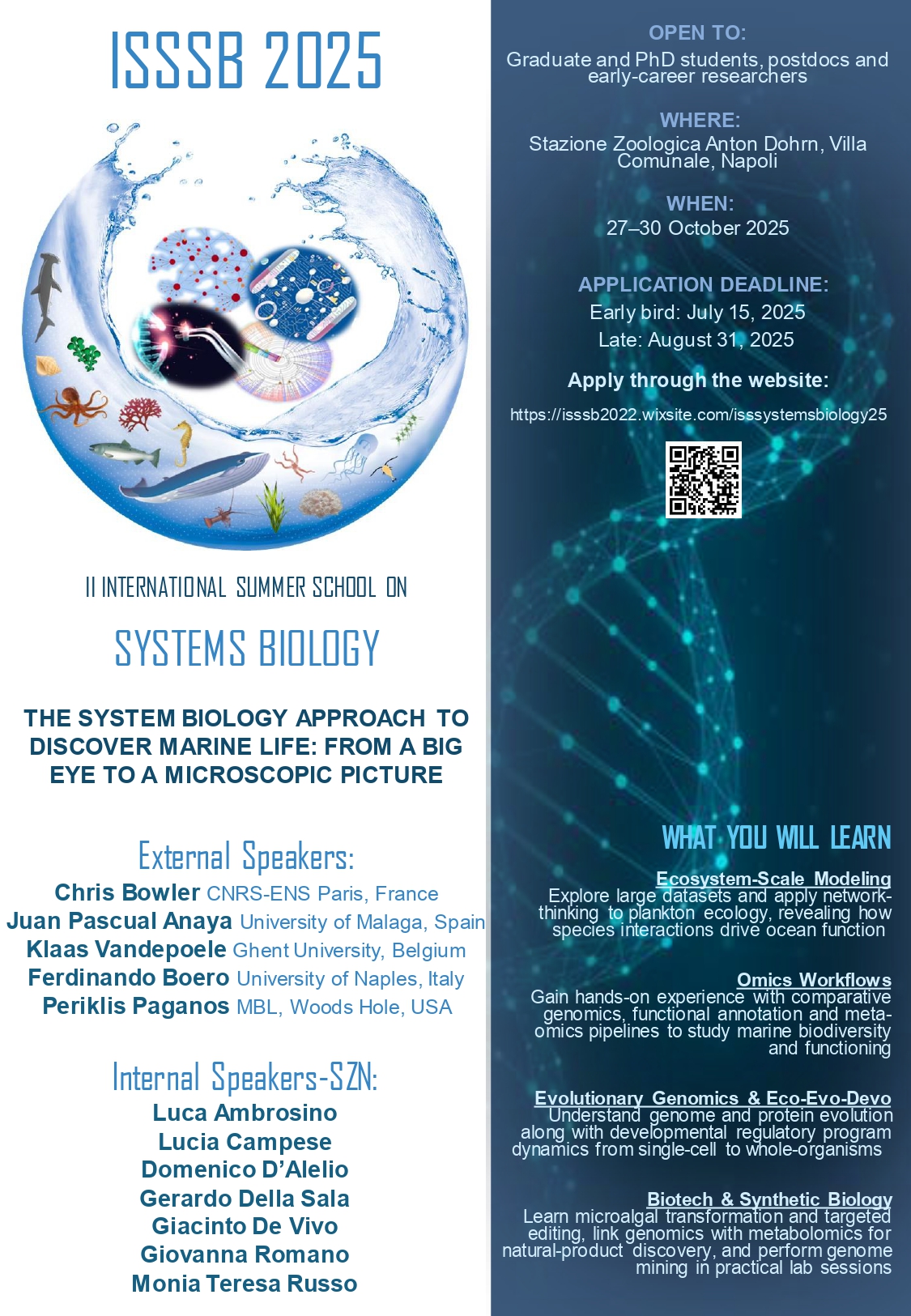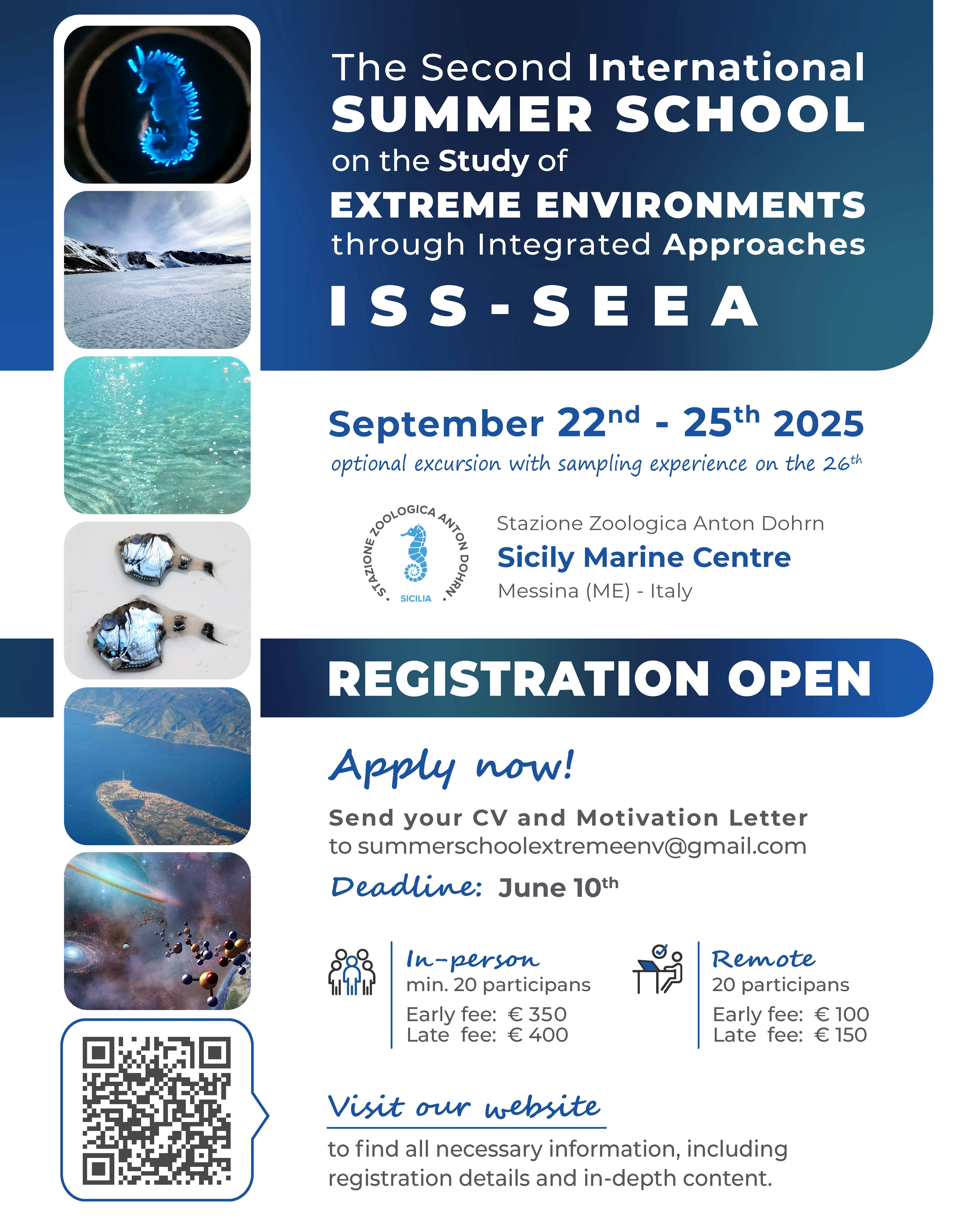Join the First Edition of the International Summer School in Bioremediation of Aquatic Environments (SSBIOREM1) which will be held at Stazione Zoologica Anton Dohrn of Naples!
Are you a graduate student, PhD candidate or early-career researcher passionate about aquatic ecosystems and sustainable solutions to decontaminate polluted ecosystems?
The International Summer School in Bioremediation of Aquatic Environments, is an intensive four-day experience blending cutting-edge science, practical training, and rich cultural immersion in one of Italy’s most iconic scientific institutions.
Taking place from 7–10 October 2025 at the Department of Ecosustanaible Marine Biotechnology (BLUBIO) sited at the Molosiglio seat (Via Acton, 55) in Naples, this school offers an unparalleled opportunity to learn directly from leading experts in environmental science, microbiology, and biotechnology. The four days of summer school will be focused on current interdisciplinary approaches used in the bioremediation field, focusing on the exploitation of microbes to remove or neutralize pollutants from contaminated sites. It can be considered a promising alternative to conventional chemical methods, which usually foresee high investment costs and do not exclude the formation of toxic byproducts.
The Summer School program organized by researchers and technologists of the Ecosustainable Marine Biotechnology Department of the SZN will enhance current knowledge in bioremediation techniques, contribute to habitat restoration efforts, and highlight the need for innovative, environmentally friendly solutions. Lectures, short communications, and practical afternoon sessions will create a stimulating environment for participants and give them skills and tools on the most updated methodologies in the remediation field.
What You’ll Learn
Bioremediation – the use of living organisms to clean up pollutants from the environment – is one of the most promising solutions to aquatic contamination. This summer school provides a comprehensive overview of the theory, techniques, and current innovations in this rapidly growing field.
Each day focuses on a key theme:
• Day 1: Impact of Pollutants and Introduction to Bioremediation – Begin with a welcome from the BLUBIO Department, followed by engaging lectures on the impacts of pollutants on human health, and the foundational roles of bacteria and microalgae in bioremediation. A hands-on lab will guide you through isolating microalgae and fungi suitable for cleaning aquatic environments.
• Day 2: Bioremediation Strategies using Microorganisms – Dive deeper into the microbial players involved in pollutant degradation, including bacteria, fungi, and algae. Learn how communities of these organisms interact in real-world remediation scenarios. In the afternoon, you’ll construct your own bioremediation microcosm, simulating contamination treatment on a small scale.
• Day 3: Innovative Approaches – Explore novel technologies like MICP (microbially induced calcite precipitation), plastic degradation using microbial enzymes, and bioleaching. Evaluate microcosm performance in the lab while discovering next-generation strategies for environmental restoration.
• Day 4: Case Studies & Success Stories – Wrap up with lectures on real-world bioremediation projects, such as the LIFE SEDREMED initiative, and discuss how lifecycle analysis and biological treatments are reshaping environmental policy and practice. The school concludes with awards for the best student presentations and posters.
Practical Learning
Beyond theoretical knowledge, this summer school is designed to equip you with hands-on experience. Daily lab sessions give you the chance to apply what you've learned, guided by leading researchers in bioremediation. You’ll practice key techniques, from microbial isolation to experimental setup and evaluation of bioremediation performance.
Meet Experts and Build Your Network
You’ll learn from renowned scientist expert in the field. Here the list of speakers that will give a lecture whose expertise covers medical ecology, molecular microbiology, and environmental chemistry and biotechnology:
The summer school also includes student presentation sessions, offering a unique platform to share your own research and receive feedback from experienced mentors and peers.
Cultural & Social Program in Beautiful Naples
When you’re not in the lab or lecture hall, enjoy the vibrant life and history of Naples! Optional evening activities include a visit to the Bagnoli-Coroglio SIN (Sites of National Interest) in the Gulf of Pozzuoli, the stunning Castel dell’Ovo, and social dinner and aperitifs – all designed to foster networking and relaxation.
Why Attend?
• Learn the science behind one of the most critical environmental challenges of our time
• Gain hands-on training in laboratory techniques
• Network with top researchers and fellow participants from across disciplines
• Discover Naples, one of Italy’s cultural treasures
Register now and secure your spot at the International Summer School in Bioremediation of Aquatic Environments! Write an email to Questo indirizzo email è protetto dagli spambots. È necessario abilitare JavaScript per vederlo.
Download the registration form at “link”
Registration fee (coffee and lunch breaks)
In-person: 330 €
Remote: 100 €
Number of participants: min. 20 (in-person), max. 2-3 (remote)
Deadline: 20 July, 2025

The Systems Biology Approach To Discover Marine Life: From A Big Eye To A Microscopic Picture
27th - 30th October 2025
Stazione Zoologica Anton Dohrn Naples - Darwin-Dohrn Museum
Villa Comunale, Naples
Systems biology aims to achieve a holistic view of biological phenomena by integrating information of different natures and studying the network of dynamic connections existing between organisms, organisms and their environment, and the molecules that underpin these dynamics (genes, proteins, secondary metabolites). To understand how each element interacts with others and influences the system, an integrated interdisciplinary approach is necessary, encompassing various scientific disciplines and expertise. Biological systems possess the extraordinary ability to adapt in response to environmental stimuli, stress, lack of food, or developmental stage, as well as the fascinating ability to correct their errors, such as gene mutations. From this perspective, given their high biodiversity, oceans represent a perfect example of a complex system whose functioning can only be understood through an interdisciplinary approach.
Systems biology thus integrates knowledge obtained through traditional approaches with that generated by the use of innovative technologies that allow for the collection of large amounts of data. These latter include, for example, genomic and transcriptomic sequencing, proteomics, and metabolomics used on an oceanographic scale (metagenomics) but also at a single-cell level (single-cell genomics). The combination of new technologies, bioinformatics software for data management, and integrated biomolecular and biochemical methods allows for the study of extremely complex biological systems with unprecedented resolution.
Based on the above description, this course aims to provide students with the foundations to develop an understanding of the study of oceans and their biodiversity through a systematic approach.
Target Audience
Open to Graduate and PhD students, postdocs and early career researchers.
Theoretical and practical lesson on:
• Ecosystem Scale Modeling
• Omics Workflows
• Evolutionary;Genomics & Eco Evo Devo
• Biotech & Synthetic Biology
Lecturers
• Chris Bowler CNRS ENS Paris, France
• Juan Pascual Anaya University of Malaga, Spain
• Klaas Vandepoele Ghent University , Belgium
• Ferdinando Boero University of Naples , Italy
• Periklis Paganos MBL, Woods Hole , USA
• Luca Ambrosino, SZN Naples, Italy
• Lucia Campese, SZN Naples, Italy
• Domenico D’Alelio, SZN Naples, Italy
• Gerardo Della Sala, SZN Naples, Italy
• Giacinto De Vivo, SZN Naples, Italy
• Giovanna Romano, SZN Naples, Italy
• Monia Teresa Russo, SZN Naples, Italy
The course is open to a maximum of 30 participants and will be held with a minimum of 20 participants.
Important Information
Application deadline:
Early Bird: July 15, 2025
Late: August 31, 2025
Apply through the website:
https://isssb2022.wixsite.com/isssystemsbiology25
Fee per person:
Early, 350 euros;
Late, 400 euros.
Organizers:
Valeria Di Dato, Rossella Annunziata, Angela Sardo, Lucia Campese, Ida Orefice
info: Questo indirizzo email è protetto dagli spambots. È necessario abilitare JavaScript per vederlo.

After the success of the first edition, which was widely attended and enthusiastically received by all the trainees, it is with pleasure that we would like to propose The Second Edition of the ISS-SEEA Summer School.
It will take place in 2025, from September 22nd to 25th (optional excursion and sampling experience on the 26th), at the Sicily Marine Centre, Stazione Zoologica Anton Dohrn, Messina. The school will maintain its multidisciplinary approach, combining the ecological and biotechnological approach for the exploration of extreme environments, and will extend its training topics by deepening other specific extreme ecosystems and new research fields. In this vein, the school will be implemented with lessons covering the concepts of bioacoustics in extreme environments, oceanographic dynamics, astrobiology, and anoxic basins. Moreover, a special focus will be devoted to the Strait of Messina and its extreme dynamics. All the training activities will be treated day by day through a combined perspective, merging ecology and biotechnology.
The summer school is a renewed opportunity to enhance cross-disciplinary collaboration and to improve skills and expertise in the knowledge of extreme ecosystems in taxonomy, high molecular approaches, bioprospecting, oceanography, and bioacoustics.
Professors and researchers will give lectures about their research and will share their experiences with the students during group discussion sessions. Practical sessions are envisaged, i.e., observation of mesopelagic species, taxonomy, laboratory experience for the treatment of samples for biotechnological purposes (production of bioactive compounds), and observation of the bioluminescence phenomenon. The second edition of the school will have, as its strong point, the involvement of young researchers from SZN-SMC, who will actively participate in the course's scientific offering, fostering exchange, interaction, and the consolidation of new networks.
· The school is open to students, PhD students, and early career researchers working in the fields of marine ecology and biotechnology.
· All students will be allowed to present their research through either a short talk or a poster.
You can find detailed program and registration information for ISS-SEEA 2025 at: https://summerschoolextrem.wixsite.com/iss-seea
Registration fee
Early bird: € 350 (in-person), € 100 (remote)
Late: € 400 (in-person), € 150 (remote)
Deadlines
· June 10: Send CV and motivation letter to: Questo indirizzo email è protetto dagli spambots. È necessario abilitare JavaScript per vederlo.
· Before payment: After receiving the acceptance notification, please complete the registration form following the instructions provided. Your registration will be confirmed by email once we receive and verify your completed form.
· June 30: Complete the Payment (early registration)
· July 31: Complete the Payment (late registration)

The Systems Biology Approach To Discover Marine Life: From A Big Eye To A Microscopic Picture
27th - 30th October 2025
Stazione Zoologica Anton Dohrn Naples - Darwin-Dohrn Museum
Villa Comunale, Naples
Systems biology aims to achieve a holistic view of biological phenomena by integrating information of different natures and studying the network of dynamic connections existing between organisms, organisms and their environment, and the molecules that underpin these dynamics (genes, proteins, secondary metabolites). To understand how each element interacts with others and influences the system, an integrated interdisciplinary approach is necessary, encompassing various scientific disciplines and expertise. Biological systems possess the extraordinary ability to adapt in response to environmental stimuli, stress, lack of food, or developmental stage, as well as the fascinating ability to correct their errors, such as gene mutations. From this perspective, given their high biodiversity, oceans represent a perfect example of a complex system whose functioning can only be understood through an interdisciplinary approach.
Systems biology thus integrates knowledge obtained through traditional approaches with that generated by the use of innovative technologies that allow for the collection of large amounts of data. These latter include, for example, genomic and transcriptomic sequencing, proteomics, and metabolomics used on an oceanographic scale (metagenomics) but also at a single-cell level (single-cell genomics). The combination of new technologies, bioinformatics software for data management, and integrated biomolecular and biochemical methods allows for the study of extremely complex biological systems with unprecedented resolution.
Based on the above description, this course aims to provide students with the foundations to develop an understanding of the study of oceans and their biodiversity through a systematic approach.
Target Audience
Open to Graduate and PhD students, postdocs and early career researchers.
Theoretical and practical lesson on:
• Ecosystem Scale Modeling
• Omics Workflows
• Evolutionary;Genomics & Eco Evo Devo
• Biotech & Synthetic Biology
Lecturers
• Chris Bowler CNRS ENS Paris, France
• Juan Pascual Anaya University of Malaga, Spain
• Klaas Vandepoele Ghent University , Belgium
• Ferdinando Boero University of Naples , Italy
• Periklis Paganos MBL, Woods Hole , USA
• Luca Ambrosino, SZN Naples, Italy
• Lucia Campese, SZN Naples, Italy
• Domenico D’Alelio, SZN Naples, Italy
• Gerardo Della Sala, SZN Naples, Italy
• Giacinto De Vivo, SZN Naples, Italy
• Giovanna Romano, SZN Naples, Italy
• Monia Teresa Russo, SZN Naples, Italy
The course is open to a maximum of 30 participants and will be held with a minimum of 20 participants.
Important Information
Application deadline:
Early Bird: July 15, 2025
Late: August 31, 2025
Apply through the website:
https://isssb2022.wixsite.com/isssystemsbiology25
Fee per person:
Early, 350 euros;
Late, 400 euros.
Organizers:
Valeria Di Dato, Rossella Annunziata, Angela Sardo, Lucia Campese, Ida Orefice
info: Questo indirizzo email è protetto dagli spambots. È necessario abilitare JavaScript per vederlo.












